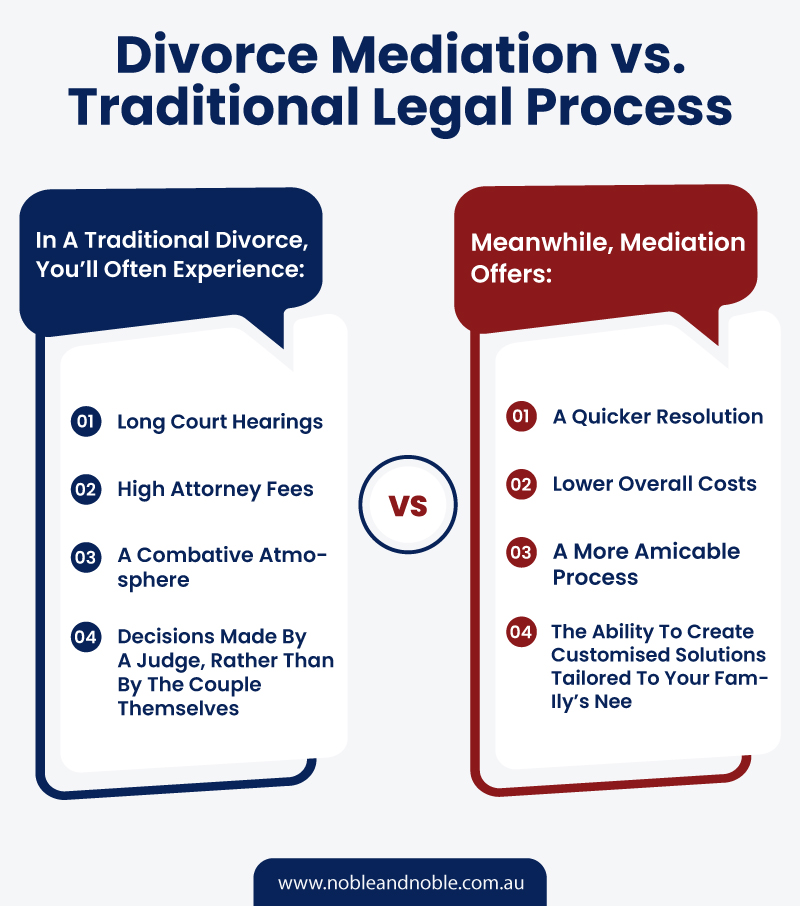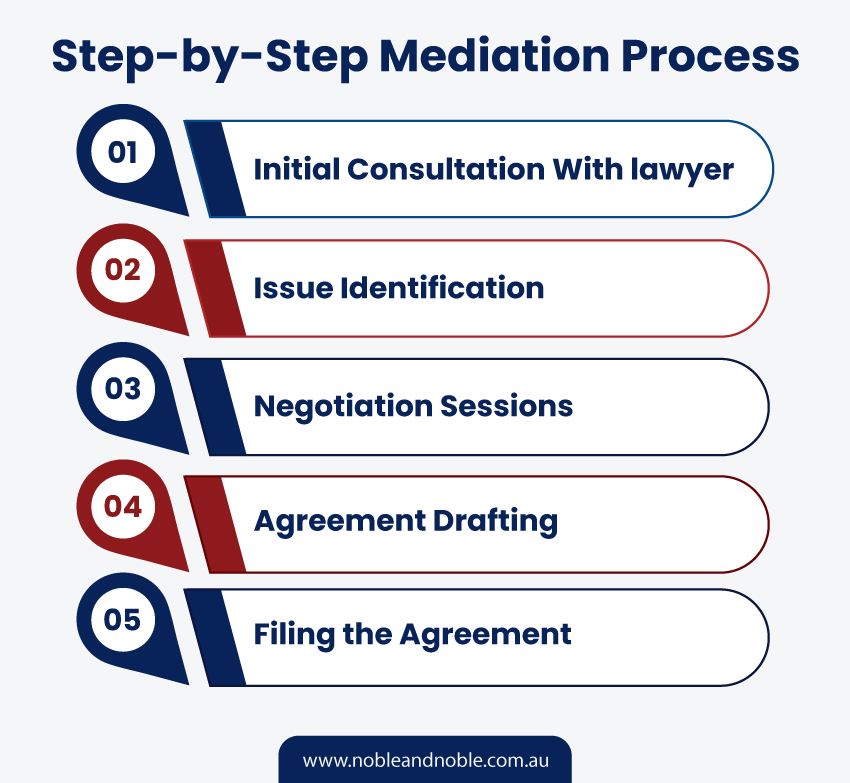
Step-by-Step Guide to Divorce Mediation Without Lawyers
Divorce is often seen as a complex, drawn-out process filled with tension, high costs, and lengthy court battles. However, there’s an alternative path that is gaining popularity for its simplicity and cost-effectiveness: divorce mediation without lawyers.
This method empowers couples to resolve their disputes amicably, without the intervention of costly attorneys. If you’re looking to save both time and money while navigating the difficult waters of separation, this step-by-step guide is for you.
Table of Contents
Why Consider Mediation Without Lawyers for Divorce?
Divorce mediation is a process where an independent third-party mediator helps separating couples come to a mutual agreement regarding key issues like asset division, child custody, and financial support.
But why choose divorce mediation without lawyers? One of the most significant reasons is cost savings. Without expensive lawyer fees, mediation becomes a more affordable option.
It also typically involves less conflict, as both parties work toward a mutually beneficial outcome rather than fighting over legal details in court.
In contrast to traditional litigation, mediation fosters collaboration rather than confrontation. Without lawyers steering the conversation toward litigation, you and your spouse can engage in constructive discussions with the goal of achieving a fair settlement that works for both parties. It is an empowering process where you maintain control over decisions that will affect your future.
Divorce Mediation vs. Traditional Legal Process

While the traditional legal process requires each spouse to retain a lawyer, file petitions, and present their case before a judge, divorce mediation without lawyers is an entirely different approach. Rather than focusing on winning or losing, mediation focuses on collaboration and compromise.
In a traditional divorce, you’ll often experience:
- Long court hearings
- High attorney fees
- A combative atmosphere
- Decisions made by a judge, rather than by the couple themselves
Meanwhile, mediation offers:
- A quicker resolution
- Lower overall costs
- A more amicable process
- The ability to create customised solutions tailored to your family’s needs
In addition, mediation is private and confidential, meaning personal issues are kept out of public records. This contrasts sharply with court cases, where proceedings are often available to the public.
How to Choose the Right Mediator?
One of the most crucial steps in divorce mediation without lawyers is selecting the right mediator. A mediator’s role is to remain neutral, facilitate open communication, and guide both parties toward a fair agreement. Since you won’t have lawyers involved, the choice of mediator becomes even more significant.
Here are key qualities to look for in a mediator:
- Experience in divorce mediation
- An understanding of family law (even if you aren’t hiring a lawyer, knowledge of the law is important)
- Strong communication skills and the ability to manage conflict
- A neutral stance that ensures fairness for both parties
Before selecting a mediator, you may want to have an initial consultation to ensure they’re the right fit. It’s crucial that both you and your spouse feel comfortable with the mediator, as their role will be essential in facilitating a successful outcome.
Step-by-Step Mediation Process

The process of divorce mediation without lawyers is relatively straightforward. Here’s how the typical mediation unfolds:
Initial Consultation: Both parties meet with the mediator for an initial discussion. In this session, the mediator explains the process, outlines the goals of mediation, and answers any questions. You’ll both need to agree to work together in good faith throughout the process.
Issue Identification: Next, you’ll identify the main issues that need to be resolved, such as property division, child custody, and spousal support. The mediator will help both parties clarify their positions and list the concerns that must be addressed.
Negotiation Sessions: Over the course of several sessions, the mediator will facilitate negotiations on each issue. This phase of mediation requires patience, cooperation, and a willingness to compromise. The mediator’s job is to guide these discussions and help resolve conflicts when they arise.
Agreement Drafting: Once the issues are resolved, the mediator will help draft an agreement that outlines the terms of the divorce. This document will include decisions on asset division, child care arrangements, and any financial obligations. It’s important that both parties thoroughly review the agreement to ensure it reflects their wishes.
Filing the Agreement: After both parties have signed the agreement, it can be filed with the court. While no lawyers are necessary during mediation, you may still want to have the final agreement reviewed by a legal professional before submitting it to ensure all legal requirements are met.
Legal Documentation Without a Lawyer
Filing legal paperwork can seem intimidating, but even in divorce mediation without lawyers, it’s entirely possible to handle the documentation yourself. In most cases, the mediator will assist in providing the necessary forms and guiding you through the filing process.
Once your mediation agreement is complete, you’ll need to file it with your local court to finalise the divorce. Here are the typical steps:
- Complete the necessary divorce forms (often available online through your local court’s website).
- Attach the signed mediation agreement to your paperwork.
- File your divorce petition along with the mediation agreement in court.
- Once the paperwork is reviewed and approved, the court will issue a divorce decree based on the terms of the agreement.
This streamlined process eliminates the need for multiple court hearings, saving you both time and stress.
Benefits of Divorce Mediation Without Lawyers
Choosing divorce mediation without lawyers comes with a multitude of benefits that can make the divorce process smoother and more manageable:
- Cost-Effective: With no need to pay attorney fees, mediation is significantly cheaper than traditional divorce proceedings.
- Faster Resolution: Since you won’t be waiting for court dates or working around busy lawyer schedules, mediation usually results in a much quicker resolution.
- Less Stress: Divorce is stressful enough without adding legal battles into the mix. Mediation fosters a cooperative atmosphere, reducing conflict and tension.
- Control Over the Outcome: Mediation allows you and your spouse to create a custom agreement that works best for your family’s needs, rather than leaving decisions up to a judge.
- Confidentiality: Your personal issues remain private, whereas in a court battle, many details become part of the public record.
These advantages are especially appealing for couples who want to maintain a level of control and civility during the divorce process.
Taking the Next Step Towards an Amicable Divorce
If you’re considering divorce mediation without lawyers, you’re already on the path to a more peaceful, cost-effective, and efficient divorce process. While the idea of navigating a divorce without legal representation may seem daunting, with the right mediator and a willingness to compromise, it’s entirely possible to resolve even complex issues amicably.
Ultimately, mediation empowers you and your spouse to maintain control over your future, ensuring that the decisions made are in the best interest of everyone involved—especially if children are a factor. By choosing mediation over traditional litigation, you’re opting for a process that prioritises collaboration, reduces stress, and minimises financial burden.
FAQs
What are the main advantages of divorce mediation without lawyers?
Divorce mediation without lawyers offers lower costs, faster resolutions, less stress, and allows both parties to retain control over the outcome, as opposed to traditional divorce litigation.
How do I find a good mediator for divorce mediation without lawyers?
Look for mediators with experience in family law, strong communication skills, and a reputation for neutrality. A good mediator helps foster productive discussions and ensures a fair agreement.
Is it possible to handle legal documentation without a lawyer?
Yes, the mediator can guide you through the process of filing necessary paperwork. It may be beneficial to have the final agreement reviewed by a legal professional before filing.
How long does divorce mediation typically take?
The process length varies depending on the complexity of the issues, but divorce mediation without lawyers usually takes several weeks to a few months, much faster than litigation.
Can I still consult a lawyer if I choose mediation without legal representation?
Absolutely. While lawyers don’t need to be involved in mediation, you can always consult one if you have questions or need a final review of your mediation agreement.
Is divorce mediation without lawyers appropriate for every couple?
Mediation works best when both parties are willing to collaborate and compromise. It may not be suitable for cases involving domestic violence or if one party refuses to cooperate.




